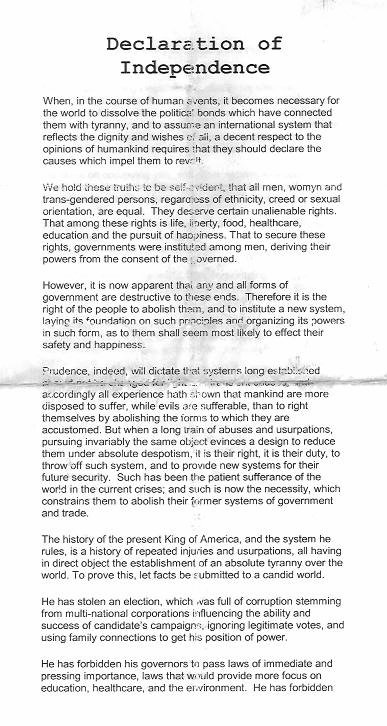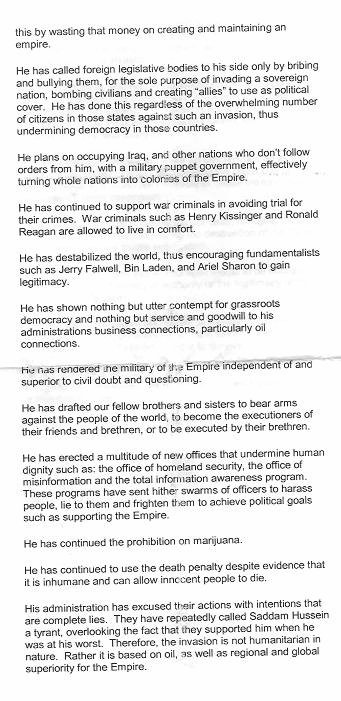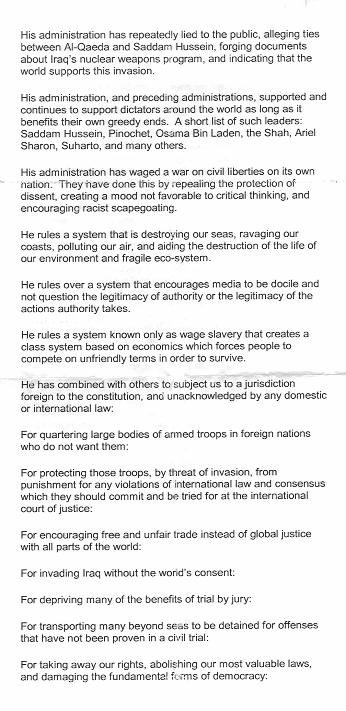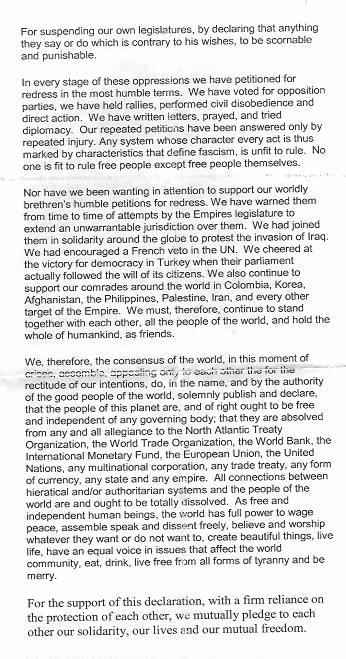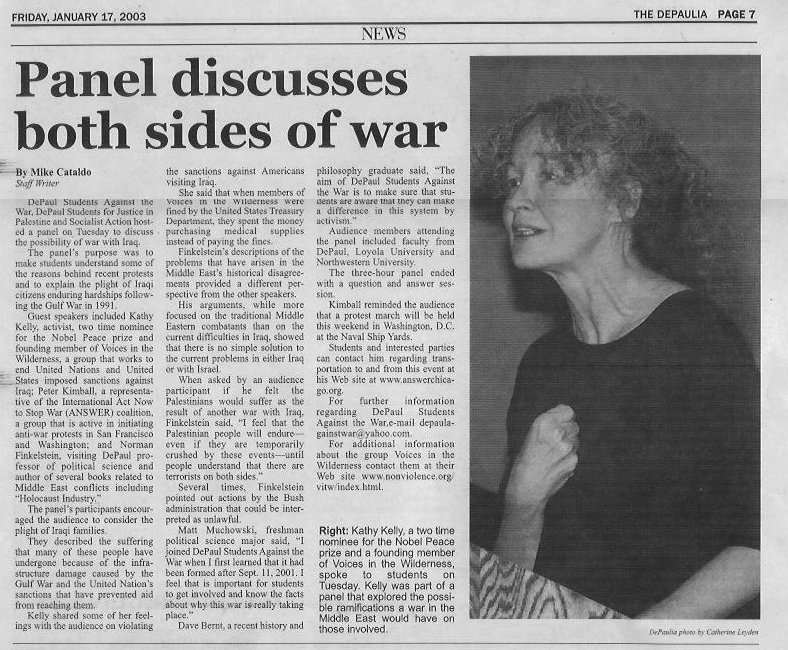What made this show different from your typical DIY punk show wasn’t the style of music, or the way people dressed, or even the politics of those in the bands and the crowd. What made it different was that every participant in the show was playing a direct role in shaping the future of the Western Hemisphere.
That punk show was a benefit for a group that was organizing to oppose the Free Trade Area of the Americas or the FTAA. Many people have not even heard of the FTAA, yet it holds to potential to radically alter the lives of millions of people. If it becomes law, the FTAA will abolish trade restrictions between 34 countries in the Western Hemisphere in an attempt to create the largest free trade zone in the world
These trade restrictions could be anything that impedes a transnational
corporation from conducting business across countries borders. The obvious example is tariffs, but these restrictions could also include labor standards laws, environmental protection laws, and publicly owned institutions.
It should be fairly obvious then that the main proponents of such an agreement would be multi-national corporations, those who believe that free trade is the best and/or only route for globalization, and those in the US who seek to dominate foreign markets. These aren’t just US based corporations though, but rather the supporters of the FTAA are showing what one might call the owners of the world uniting.
The specifics of the agreement are shrouded in secrecy to all but the negotiators and representatives of various American corporations, so it’s hard to tell exactly what the FTAA will entail. While corporate representatives are given easy access to the negotiations, Lori Wallach said, “The Public and civil society groups have been shut out of the FTAA talks since they began,” (Public Citizen, 3).
What can be expected is that the FTAA will be an extension of previous trade agreements the US has negotiated in secret and signed, or trade agreements that it is currently negotiating in secret.
This line of free trade agreements the US has made begins with the US/Canada Free Trade Agreement. Signed into law on January 2, 1988, one of the FTA’s supporters Barbara McDougall observed that the pact, “has been debated at a visceral level that we have not experienced since the referendum on Quebec independence in 1980” (181). Even the Canadian supporters of the agreement had to admit it’s controversial content. As we discussed in class, the agreement became so unpopular in Canada that once implemented, the conservative Prime Minister Brian Mulroney’s party went from having the majority of seats in Parliament to having a measly two seats in Parliament.
That didn’t convince the US though. The US went ahead and started negotiating a bi-lateral trade agreement between the US and Mexico. When Canadian corporations wanted to get into those negotiations, the North American Free Trade Agreement was born.
NAFTA became a controversial topic in the US as people like Ross Perot and Pat Buchannan argued against it. The arguments of those opposed to it were largely dominated by nationalist, isolationist, protectionist, and (in my view) racist views. They would paint NAFTA as though Mexicans were stealing good US jobs. Perot would say you could hear “a giant sucking sound” as jobs went south of the border.
Regardless, NAFTA went into effect on new years day 1994. Like it’s predecessor, NAFTA abolished tariffs between those who signed it, but it added on an interesting provision called chapter11. Ch. 11 of NAFTA allowed any corporation from the US, Canada, or Mexico to sue the governments of either of the other countries if there was a law in any of them that prevented them from obtaining a profit.
It took less than a year after NAFTA was implemented for the neo-liberals to start work on the Free Trade Area of the Americas. The FTAA would extend NAFTA to include every county in the western hemisphere except for Cuba.
The FTAA’s official life began at the Summit of the Americas in December 1994. There has been a meeting every year since to form the FTAA. Its most recent meeting was in Quito, Ecuador, and its next meeting will be in Miami, USA.
It’s important to note that these meetings take place and where because the sites of these meetings have been the location of resistance to the FTAA.
When the Summit of the America’s was held in Quebec, Canada, over a hundred thousand people came to protest the FTAA. Unionists, environmentalists, and anti-capitalists flocked to march, shout, and tear down the fence that was erected to protect the FTAA meetings. As a video produced by the Independent Media Center reports, the meetings in Quebec were ‘protected’ by 6000 police officers who fired a total of 5148 tear gas canisters and 900 rubber bullets at protestors.
Similar events happened when the FTAA met in Ecuador, and it seems very likely that there will be resistance to the FTAA in Miami. There have been several calls to action against the FTAA meeting in Miami put out in the previous weeks and months. The most famous, “Days Hopeful and Radiant,” says, “this is the invitation that you and 800 million of your closest friends have been waiting for. We…are calling for creative, decentralized, autonomous actions in response to the FTAA ministerial,”
These diverse groups have a lot of reasons why they resist the implementation of the FTAA. Even though the specifics of the FTAA are held in secret, these groups can look at the effects of the previous Free Trade Agreements, the effects they had on people, and assume that the FTAA will affect people in similar ways.
The passing of NAFTA has resulted in the loss of well paying US jobs and created more sweatshops in Mexico as workers from the US, Mexico and Canada are forced to compete against each other in a race towards the bottom of wages. To see this one only has to look at the Maquiladoras created just south of the US/Mexico border.
The Maquiladoras, “allow Mexican and foreign investors to establish manufacturing plants in selected areas of Mexico to produce for export… US-made components [are used] to produce finished or semi-finished goods that are exported, usually back to the United States.” (US GAO, 1).
“It’s estimated that 5-6 million US jobs have been lost since NAFTA came into effect as companies relocated to Mexic[an maquiladoras] to take advantage of the weaker labor standards and lower wages,” (Sullivan, 14). The difference between why these groups see it as a problem, and why Pat Buchannan sees it as a problem is where they place the blame. Buchannan blames the Mexican workers who will work for lower wages, the diverse groups I speak of blame the corporations and trade agreements that create a competitive market economy.
You can also see the effect of these free trade agreements in the privatization and commodification of basic human necessities. Privatization is not exclusive to free trade agreements; the main ingredient in World Bank and IMF’s Structural Adjustment Programs is privatization.
These Trade Agreements take it to a new level though. Under NAFTA, Mexico had to rewrite article 27 of its constitution so that, “for the first time since the Mexican revolution, campesino communities are vulnerable to privatization and the loss of their lands,” (Wallach, 1). That was one of the main reasons why the Zapatista movement in Chiapas Mexico went in open revolt against NAFTA and neo-liberalism.
Economist Michel Chossudovsky believes that the FTAA will take privatization to new levels:
“If a government finances health or education, this service must be opened to international bidding. And who would bid? The large corporations would take control, all community based facilities would be transformed into profit-making undertakings; schools, sports clubs, day-care centers, everything. Moreover, the FTAA clauses would literally allow for the privatization of municipalities. Water, sewer systems, roads and municipal services would be owned and operated by private companies (rather than by citizens)…The FTAA would also allow for the privatization of water, inter-city highways as well as entire urban areas,” (4).
The FTAA will also attack the environment through it’s own form of NAFTA’s Chapter 11. To understand the impact that a hemispheric Chapter 11 would have, one only has to look at the adverse effects a continental Chapter 11 has had on environmental protection laws.
In California Ch. 11 was used by a Canadian company called Ethanex. Ethanex is a gas company that was exporting gas with a chemical called MTBE to California. MTBE was found by the state of California to pose a health hazard once it entered the water supply. In fact not only was MTBE harmful, but it was notoriously hard to keep from leaking into water supplies and “Santa Monica, Calif., with 93,000 residents had to shut down most of its municipal wells when gasoline containing MTBE leached into the drinking water a few years ago,” (DePalma, 3). So the Californian government banned it. However Ethanex is challenging that ban by using Ch. 11. The courts that hear Ch. 11 cases are special NAFTA tribunals that are closed to the public, so not much is known about the case, however there has yet to be a ruling on it. The same is not true about a US gas company, Ethyl, which used threats of Ch. 11 to force the Canadian government to lift a ban on a chemical called MNT.
Another case was when the US company Metalclad. Members of the Mexican government told Metalclad that they couldn’t build a toxic dump because it would pollute Mexico’s aquifer and threaten rare cactus. Metalclad then sued the Mexican government under chapter 11 of NAFTA. A secret tribunal ruled in favor of Metalclad and the Mexican government was forced to pay them close to 17 million dollars.
These ruling and uses of Ch. 11 expose the undemocratic nature of these trade agreements. These Agreements allow capital to flow across borders, but not humans. They allow hierarchically structured corporations to be above the law while civilian structures that are more egalitarian pay the price that corporation’s demand of them. Nothing explains this point more than what Grant Kessler, President of Metalclad said, “Every advisor that I had in Mexico told me, if the governor supports this project, you don’t have to worry about the local community,” (Bill Moyers).
Those are some of the anti-market reasons to be opposed to the FTAA, however there are even those in favor of the market that are opposed the FTAA. Nobel Prize winning economist, Joseph Stiglitz recently said about the FTAA, “If the United States doesn’t make something very significant about the agriculture and taxes barriers, it would make no sense for Brazil to sign the Agreement,” (Real World Radio). What Stiglitz is talking about is how the US heavily subsidizes it’s large agribusiness firms, so when tariffs are taken down between the US and another country, the other country’s agribusiness can’t compete with the lower subsidized prices of US agri-companies.
The effects of this were seen quite visibly in Mexico after NAFTA was passed where, “NAFTA allowed US agri-businesses like ADM and Cargill to flood the Mexican market with low quality, highly subsidized corn. The flood of US corn forced small-scale Mexican growers out of the market,” (Wallach, 1). When these small farmers are forced out of the market they are often forced to relocate, sometimes across the border to the US, or take lower paying jobs, often in the Maquiladoras.
Many proponents of Free Trade outside the US see this as interfering with the market. It was this issue that contributed to the collapse of the World Trade Organization meeting in Cancun, Mexico. The G-22, made up of 22 developing states such as Brazil, China and India stood together in the World Trade Organization meeting to demand that the US stop it’s subsidizing of Agriculture.
Brazil has led the resistance of free traders against US subsidizing of Agriculture, both in the WTO, and against the FTAA. Brazil’s center-left president Lula has been trying to expand the influence of a South American Free Trade area called Mercosur. This would give Brazil an edge in negotiating the FTAA to include a reduction or cancellation of the US subsidies:
“Brazil is insistent that the FTAA will only become reality if the US government vastly reduces its subsidies to US agribusiness. These subsidies allow the industry to sell its goods significantly below the cost of production- a practice known as “dumping” in trade parlance, and one that is supposedly antithetical to free traders such as the Bush Administration. But the recent US farm bill locked in some $170 billion in such subsidies over the next ten years,” (Weiss, 1)
The US under the more protectionist and unilateral Bush administration is trying to keep giving these subsidies while reducing trade barriers. The actions of the Bush administration lead many to believe that it doesn’t want Free Trade; rather it wants to dominate other countries markets without allowing them access to the US market. This can bee seen not only in the agricultural subsidies, but also in the tariffs on Steel that the Bush administration put in place.
With that goal, and it’s implementation of a hemispheric trade pact in danger, they have started to “divide and conquer” (Rohter, 3) by negotiating more bi-lateral trade agreements, like they recently did with Chile and Singapore, as well as smaller multi-lateral agreements like the Central American Free Trade Agreement. The White Houses own Website admits that CAFTA is intended to advance the FTAA, without reducing US corporate welfare subsidies:
This negotiation will complement the United States’ goal of completing the Free Trade Area of the Americas no later than January 2005 by increasing the momentum in the hemisphere toward lowering barriers, opening markets, and achieving greater transparency… Furthermore, by working together on common disciplines and trade objectives through bilateral negotiations, the United States will enhance the ability of all parties to forge [the Washington] consensus in other multilateral trade negotiations, especially, the FTAA.
The way the Bush administration is acting is only supporting the theories that the skeptics of globalization have. They believe that nation states are the ones creating the global economy, and are segmenting into regional trading blocks more than creating a worldwide market.
As we talked about in class, the WTO, World Bank and IMF are all hesitant about
regional trading blocks. What they really want is one worldwide free trade zone. So the way the US is able to sell these regional trade blocks to the WTO, WB and IMF is by claiming that they are steps towards that worldwide free trade zone. The fact that the US continues to expand it’s zone of free trade with other states proves to some extent that it is seeking a world wide free trade zone, which may be why the FTAA’s website, www.ftaa-alca.org claims that the FTAA will be “WTO-consistent.” (About the FTAA, 1)
Both regional trade blocks and a worldwide market are opposed by two main political ideologies. Nationalists, isolationists and protectionists are “suspicious of free trade because their worried about layoffs in industries that were previously protected from foreign competition by tariffs,” (Free Trade).
There is another group that doesn’t want to protect their national industries, but rather want an international economic system, just not the one we currently have. This would include those who want to reform the WTO, World Bank and IMF to include standards on labor and the environment, as well as those who seek to abolish those institutions in an anti-capitalist revolution that will value labor and the environment more.
Both the reformist and revolutionary segments of the internationalist anti-free trade movement have drafted ideas for alternatives to corporate globalization. When the FTAA met in Quebec activists held a counter-event called the Peoples Summit, where they ripped apart free market fundamentalism and outlined alternatives. The World Social Forum is another event that has been held as a counter to the World Economic Forum. Several groups have begun drafting an Alternative Agreement of the Americas, which promotes fair trade over free trade. While radical economists like Micheal Albert have written about concepts such as participatory economics.
The punk show I mentioned is not the only sound against the FTAA. The outpouring of voices against the FTAA and in favor of alternative international economic relations can drown out the “giant sucking sound”, Free Market Fundamentalism and the Washington Consensus combined. A loud cry is being heard across the hemisphere as 900 million people sing, shout and scream in their native tongue, song and dance, “NO TO THE FTAA!”
Works Cited
“About the FTAA.” November 1, 2003. www.ftaa-alca.org/view_e.asp
Bill Moyers Reports: “Trading Democracy.” Videocassette. Produced by Sherry Jones.
2002. 57 min.
Chossudovsky, Michel. The Quebec Wall. April 20, 2001.
DePalma, Anthony. “NAFTA’s Powerful Little Secret.” The New York Times. March
11, 2001
Introductory Economics: “Free Trade” Videocassette. Dir. Susan Murgatroyd. 1996. 27
Min.
McDougall, Barbara. “Political Perspectives.” The Canada-United States Free Trade
Agreement: The Global Impact. Ed. Jeffrey J. Schott, and Murray G. Smith.
Washington DC: Institute for International Economics, 1988. 181-195.
Public Citizen. Crises in FTAA Negotiations Triggers Secret, Invitation-Only FTAA
“Mini-Ministerial” meeting at Exclusive Chesapeake Bay Enclave. Common
Dreams. June 12, 2003. www.commondreams.org
Real World Radio. Nobel Prize Winner against the FTAA, With Joseph Stiglitz. Nov. 4,
2003.
Rohter, Larry. “New Global Trade Lineup: Haves, Have-Nots, Have-Somes.” New York
Times. Nov. 2, 2003.
Sullivan, Cathleen. Free Trade Area of the Americas: Demystifying the Corporate
Jargon. Alliance for Global Justice, Feb. 2001.
Trading Freedom: “the Secret Life of the FTAA”. Video. Producer Independent Media
Center, www.indymedia.org. 2003.
United States General Accounting Office. US-Mexico Trade: The Maquiladora Industry
and US employment. Washington, GAO, July 1993.
Wallach, Jason. Ten Years of NAFTA: A Decade of Zapatismo. Mexico Solidarity
Network. October 3. www.mexicosolidarity.org
Weiss, Larry. CAFTA: Will the Central American Free Trade Agreement Fly? Resource
Center of the Americas. March 2003. www.americas.org
The White House. Fact Sheet—US-Central American Free Trade Agreement. Nov. 6,


